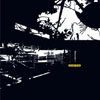 Delivery Room is a bargain-priced sampler of new and upcoming releases from the Leaf Label, and reflects the eclectic, modern aesthetic of label boss Tony Morley. Unfortunately, as is often the case with collections such as these, there is a fair amount of substandard material by bands the label hopes to promote, as well as songs that suffer from the lack of context inherent in a compilation.
Delivery Room is a bargain-priced sampler of new and upcoming releases from the Leaf Label, and reflects the eclectic, modern aesthetic of label boss Tony Morley. Unfortunately, as is often the case with collections such as these, there is a fair amount of substandard material by bands the label hopes to promote, as well as songs that suffer from the lack of context inherent in a compilation.
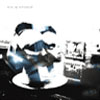 The melodies might be vibrant and the arrangements lush, but nothingcan fix the feeling that there's a lot of counterfeit sentiment beingtossed around this album. I'd like to say I felt something whilelistening to this record, but the vocal delivery and the sappy,over-romantic instrumentation simply sounded too much like a bad radiodrama to be interesting. Fakeopens up with the seven minute creeper, "Born." The vocalist soundslike he is trying hard to say something that is emotionally drainingand utterly important, but he comes across sounding like a 10 year oldboy convinced that he's in love. Speaking of 10 year old boys, thelyrics sound as though they're meant to convey all sorts of meanings(it's the delivery of the singer that makes them sound so important)but I'm not sure I understand what he's singing about on "Born." I'mnot sure I know what's going on in any of these ten songs to tell thetruth. Blow Up Hollywood are obviously reaching for some lofty conceptthat will lift them up above other bands and into the realms of"important" and "socially conscious;" one look at their website and itseems like they've got this grand Zen-influenced statement to make.This teenager-symptom (self-importance?) ruins what talent the bandhas. That self-importance isn't just in the singer's head, though,otherwise I might have been able to enjoy the album for its music. Themusic sounds like a half-assed attempt at mixing the grandeur oforchestral music with the glossy sheen of popular rock n' roll radio.There's absolutely no grit anywhere on the record, that's what makes it sound so damned self-important and phony.There's absolutely no sign of anger, no sign of confusion, or any hintthat maybe pain could take part in these sappy meanderings. That slickand prosthetic production accounts for 90% of what's wrong with themusic. There might be room for this somewhere in a bad movie where theboy finds the girl and they fall in love all over again despite thefact that, while she was away, he was busy with about 10 other girls.Right, suddenly jackass is in love and everything's going to be okayand in the end there's going to be a white picket fence, little cryingbastards everywhere, and a dog attacking the mailman in the front yard.Forgive me for being so angry, but when a mediocre album entitled Fakecrosses my path and then tries to play itself off as ananti-establishment or somehow spiritually fulfilling record thateschews all pretense, I tend towards a complete lack of faith in thehonestly rebellious spirit and begin to think that maybe the last 10years of federally sponsored media mergers has completely killed anyreal chance of music inspiring righteous indignation and civildisobedience ever again.-
The melodies might be vibrant and the arrangements lush, but nothingcan fix the feeling that there's a lot of counterfeit sentiment beingtossed around this album. I'd like to say I felt something whilelistening to this record, but the vocal delivery and the sappy,over-romantic instrumentation simply sounded too much like a bad radiodrama to be interesting. Fakeopens up with the seven minute creeper, "Born." The vocalist soundslike he is trying hard to say something that is emotionally drainingand utterly important, but he comes across sounding like a 10 year oldboy convinced that he's in love. Speaking of 10 year old boys, thelyrics sound as though they're meant to convey all sorts of meanings(it's the delivery of the singer that makes them sound so important)but I'm not sure I understand what he's singing about on "Born." I'mnot sure I know what's going on in any of these ten songs to tell thetruth. Blow Up Hollywood are obviously reaching for some lofty conceptthat will lift them up above other bands and into the realms of"important" and "socially conscious;" one look at their website and itseems like they've got this grand Zen-influenced statement to make.This teenager-symptom (self-importance?) ruins what talent the bandhas. That self-importance isn't just in the singer's head, though,otherwise I might have been able to enjoy the album for its music. Themusic sounds like a half-assed attempt at mixing the grandeur oforchestral music with the glossy sheen of popular rock n' roll radio.There's absolutely no grit anywhere on the record, that's what makes it sound so damned self-important and phony.There's absolutely no sign of anger, no sign of confusion, or any hintthat maybe pain could take part in these sappy meanderings. That slickand prosthetic production accounts for 90% of what's wrong with themusic. There might be room for this somewhere in a bad movie where theboy finds the girl and they fall in love all over again despite thefact that, while she was away, he was busy with about 10 other girls.Right, suddenly jackass is in love and everything's going to be okayand in the end there's going to be a white picket fence, little cryingbastards everywhere, and a dog attacking the mailman in the front yard.Forgive me for being so angry, but when a mediocre album entitled Fakecrosses my path and then tries to play itself off as ananti-establishment or somehow spiritually fulfilling record thateschews all pretense, I tend towards a complete lack of faith in thehonestly rebellious spirit and begin to think that maybe the last 10years of federally sponsored media mergers has completely killed anyreal chance of music inspiring righteous indignation and civildisobedience ever again.-  I had been wondering when we'd see the first of the post-Sigur Rosreleases to emerge. It's been several years since Iceland's finestwowed listeners just about everywhere and I always imagined that theresult would be an avalanche of artists trying to recreate the feelingof being swept up in the epic, weepy tones of bowed guitars andreverb-drenched organs. Julian Fane, a 21-year old Canadian solo artistis the fist thing I've heard that immediately and unquestionably callsforth that otherworldy music from the north, but he does a lot morethan that. The release is a bit odd for Planet µ, a label that's madeits name more on dancey and not-so-dancey but still beat-centriceclectic electronic artists like Venetian Snares, Jega, Bit_Meddler andso on. Still, there is an undercurrent of strong electronics throughoutSpecial Forcesthat tips Fane's hand as someone familiar enough with the glitch-beatsound of his contemporaries to know how to pique the µ-Ziq fans'interest. The beats certainly don't take center stage though, as theyclick and thump under waves of rich and fuzzy synth tones, manipulatedacoustic instruments, and occassionally Fane's own voice. It's at thispoint that my opinion of the record is decidedly split. For most of thetracks, the wintery strings and crackling percussion work well andprovide moments of real (and not just emulated) beauty. But when Fanesteps in to sing in an unintelligible falsetto, the album tends toderail for me into a place where just sounding like other people'srecords turns in to trying to recreate them. The first two songs withsinging are actually pleasant and well-balanced. While the high-pitchedwhiny vocal style so reminiscent of Thom Yorke and Jónsi Birgissonisn't my favorite, it doesn't detract from the lush soundscapes intowhich Fane plants his voice. However, successive songs with vocalsdeteriorate quickly into what sounds likea parody—this is JimmyFallon's impression of Hopelandic and it's funny, but it's not supposedto be. Thankfully, the vocal tracks are far-outweighed by the rest ofthe album's solid instrumentals. I can certainly forgive the youngcomposer's few vocal missteps on an otherwise excellent debut on whichhe has created another perfect winter soundtrack for thebroken-hearted.
I had been wondering when we'd see the first of the post-Sigur Rosreleases to emerge. It's been several years since Iceland's finestwowed listeners just about everywhere and I always imagined that theresult would be an avalanche of artists trying to recreate the feelingof being swept up in the epic, weepy tones of bowed guitars andreverb-drenched organs. Julian Fane, a 21-year old Canadian solo artistis the fist thing I've heard that immediately and unquestionably callsforth that otherworldy music from the north, but he does a lot morethan that. The release is a bit odd for Planet µ, a label that's madeits name more on dancey and not-so-dancey but still beat-centriceclectic electronic artists like Venetian Snares, Jega, Bit_Meddler andso on. Still, there is an undercurrent of strong electronics throughoutSpecial Forcesthat tips Fane's hand as someone familiar enough with the glitch-beatsound of his contemporaries to know how to pique the µ-Ziq fans'interest. The beats certainly don't take center stage though, as theyclick and thump under waves of rich and fuzzy synth tones, manipulatedacoustic instruments, and occassionally Fane's own voice. It's at thispoint that my opinion of the record is decidedly split. For most of thetracks, the wintery strings and crackling percussion work well andprovide moments of real (and not just emulated) beauty. But when Fanesteps in to sing in an unintelligible falsetto, the album tends toderail for me into a place where just sounding like other people'srecords turns in to trying to recreate them. The first two songs withsinging are actually pleasant and well-balanced. While the high-pitchedwhiny vocal style so reminiscent of Thom Yorke and Jónsi Birgissonisn't my favorite, it doesn't detract from the lush soundscapes intowhich Fane plants his voice. However, successive songs with vocalsdeteriorate quickly into what sounds likea parody—this is JimmyFallon's impression of Hopelandic and it's funny, but it's not supposedto be. Thankfully, the vocal tracks are far-outweighed by the rest ofthe album's solid instrumentals. I can certainly forgive the youngcomposer's few vocal missteps on an otherwise excellent debut on whichhe has created another perfect winter soundtrack for thebroken-hearted.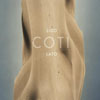 Though I've heard the formula before, it's impossible to disregard this album. Despite being another quiet and minimalist approach to electronic soundscaping, there's something special about the way these songs play themselves out and, in some cases, the integration of just a few key sounds adds up to startling beauty. Lido Lato is a double CD release from Greece's Poeta Negra label.
Though I've heard the formula before, it's impossible to disregard this album. Despite being another quiet and minimalist approach to electronic soundscaping, there's something special about the way these songs play themselves out and, in some cases, the integration of just a few key sounds adds up to startling beauty. Lido Lato is a double CD release from Greece's Poeta Negra label.
 Greg Dulli has always been able to pull off an entertaining cover nowand then when he takes his traveling band on the road. For their latestrelease, he's decided to record a whole album of songs he didn't write,and, based upon comments on his website, some of the choices might bewholly on dares from friends. It's a refreshing collection, as Dullidoesn't stay just in one genre, or interpret the songs all in the samefashion, which makes for some real gems and a few missteps, in trueDulli tradition. The album opens with a rather mellow number in"Feeling of Gaze," a Hope Sandoval tune that could easily have beensultry with her, but Dulli makes it his melancholy own. Then it's "TooTough to Die," which he also manages to pull off despite occasionalcracks of voice, and the record starts to move into "I can't believehe's a man, and he's still killing these songs by women" territory. Thenext one is the real killer, though: "Hyperballad" is not exactly asong that would seem well-suited to his style, but with the Singersit's a proud, soaring, and glorified take on Björk's tune ofself-destruction. "Hyperballad" is also the first complaint, as themixing on the chorus is almost ruined by the distortion coming throughthe speakers. Somehow, the whole package is not ruined and the songrises above anyway. As does "What Makes You Think You're the One," eventhough Dulli's vocal sounds just a twinge off for the whole song,calling back to "Band of Gold" from the Uptown AvondaleEP. That's part of the reason to admire Dulli and his effort, though,as he doesn't seem concerned with sounding like the best rendition ofthe song ever, just sounding passable and putting out a version of thesong he likes, even though it may tweak the ears a bit. It's all worthit on something like "Real Love" — yes, the Mary J. Blige version — or"Black is the Color of My True Love's Hair," which was released on asingle all its own last year, but its inclusion makes the set completeand a little sweeter. By the time Gershwin's "Summertime" comes around,the album takes a real sharp dark turn. That's Dulli's style exactly,and though these songs may jar here and there they do make a mark.
Greg Dulli has always been able to pull off an entertaining cover nowand then when he takes his traveling band on the road. For their latestrelease, he's decided to record a whole album of songs he didn't write,and, based upon comments on his website, some of the choices might bewholly on dares from friends. It's a refreshing collection, as Dullidoesn't stay just in one genre, or interpret the songs all in the samefashion, which makes for some real gems and a few missteps, in trueDulli tradition. The album opens with a rather mellow number in"Feeling of Gaze," a Hope Sandoval tune that could easily have beensultry with her, but Dulli makes it his melancholy own. Then it's "TooTough to Die," which he also manages to pull off despite occasionalcracks of voice, and the record starts to move into "I can't believehe's a man, and he's still killing these songs by women" territory. Thenext one is the real killer, though: "Hyperballad" is not exactly asong that would seem well-suited to his style, but with the Singersit's a proud, soaring, and glorified take on Björk's tune ofself-destruction. "Hyperballad" is also the first complaint, as themixing on the chorus is almost ruined by the distortion coming throughthe speakers. Somehow, the whole package is not ruined and the songrises above anyway. As does "What Makes You Think You're the One," eventhough Dulli's vocal sounds just a twinge off for the whole song,calling back to "Band of Gold" from the Uptown AvondaleEP. That's part of the reason to admire Dulli and his effort, though,as he doesn't seem concerned with sounding like the best rendition ofthe song ever, just sounding passable and putting out a version of thesong he likes, even though it may tweak the ears a bit. It's all worthit on something like "Real Love" — yes, the Mary J. Blige version — or"Black is the Color of My True Love's Hair," which was released on asingle all its own last year, but its inclusion makes the set completeand a little sweeter. By the time Gershwin's "Summertime" comes around,the album takes a real sharp dark turn. That's Dulli's style exactly,and though these songs may jar here and there they do make a mark.  With this year's eigth Piehead release the Oregon-based ml havecuriously decided to crank out a full-length homage to the music ofspooky film director and composer, John Carpenter. Many may not knowthat Carpenter often likes to write the music for his films, givingcampy classics like Big Trouble in Little China and Dark Startheir appropriately stiff and synth-heavy backing. ml, on the otherhand, are more known for their tricked out beats and goofy sense ofhumor that place them firmly in the west coast new electronicpsuedo-dance family these days, so while it's not what I expected fromthe former Thine Eyes guys, it's not hard to imagine either. I'm notsure how noble it is to crib someone else's style so deliberately thatit becomes a tribute, but somehow Man Is The Warmest Place To Hidemanages to be both fun and faithful to the source without ever soundingcheap. Well, it's no cheaper than a John Carpenter score so it seems tobe working on that level. The music is all a series of simple themeswith a filmic overtone that makes them moody but not overlycomplicated. While the sounds don't come from a Carpenter film, it'seasy to see them working with one. Most of the timbres are liftedstraight from vintage synths (or vintage synth emulators as may be thecase) and the sound design is intentionally not clever or obtrusive.The few places where the guys resort to more recent sounding filtersand patches actually take the songs out of that full-on Carpenter worldand help bridge the gap between goofy experiment and music that'sactually enjoyable on its own. Ml have never established a firm styleto my ears over the years. They tend to blend in with other acts fromthe Pacific northwest who trade in quirky, laptop-fueledpost-industrial beat making and so it's a little ballsy for them to putsomething like this out that gives most of the stylistic cues up tounseen source material. I'd like to see more people try this sort ofthing, if only to see what talented musicians can do with an artificialbut well-understood set of limitations. The obvious question is: is therecord worth listening to outside of the context of the John Carpenterangle, and I'm not sure about that. I suppose the answer lies in howmuch you like John Carpenter's music. It definitely feels a littlecheesy if you take away the idea that it's an homage, but if you knowgoing in what it's all about, it's quite a fun thing to spin. As itstands though, this is my favorite batch of ml songs to date, and I'mnot sure what that means for the rest of their discography. What itmeans for now is that Piehead scores again with another release we'renot likely to have seen without this special series, which is prettyawesome.
With this year's eigth Piehead release the Oregon-based ml havecuriously decided to crank out a full-length homage to the music ofspooky film director and composer, John Carpenter. Many may not knowthat Carpenter often likes to write the music for his films, givingcampy classics like Big Trouble in Little China and Dark Startheir appropriately stiff and synth-heavy backing. ml, on the otherhand, are more known for their tricked out beats and goofy sense ofhumor that place them firmly in the west coast new electronicpsuedo-dance family these days, so while it's not what I expected fromthe former Thine Eyes guys, it's not hard to imagine either. I'm notsure how noble it is to crib someone else's style so deliberately thatit becomes a tribute, but somehow Man Is The Warmest Place To Hidemanages to be both fun and faithful to the source without ever soundingcheap. Well, it's no cheaper than a John Carpenter score so it seems tobe working on that level. The music is all a series of simple themeswith a filmic overtone that makes them moody but not overlycomplicated. While the sounds don't come from a Carpenter film, it'seasy to see them working with one. Most of the timbres are liftedstraight from vintage synths (or vintage synth emulators as may be thecase) and the sound design is intentionally not clever or obtrusive.The few places where the guys resort to more recent sounding filtersand patches actually take the songs out of that full-on Carpenter worldand help bridge the gap between goofy experiment and music that'sactually enjoyable on its own. Ml have never established a firm styleto my ears over the years. They tend to blend in with other acts fromthe Pacific northwest who trade in quirky, laptop-fueledpost-industrial beat making and so it's a little ballsy for them to putsomething like this out that gives most of the stylistic cues up tounseen source material. I'd like to see more people try this sort ofthing, if only to see what talented musicians can do with an artificialbut well-understood set of limitations. The obvious question is: is therecord worth listening to outside of the context of the John Carpenterangle, and I'm not sure about that. I suppose the answer lies in howmuch you like John Carpenter's music. It definitely feels a littlecheesy if you take away the idea that it's an homage, but if you knowgoing in what it's all about, it's quite a fun thing to spin. As itstands though, this is my favorite batch of ml songs to date, and I'mnot sure what that means for the rest of their discography. What itmeans for now is that Piehead scores again with another release we'renot likely to have seen without this special series, which is prettyawesome. 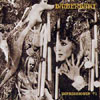 The latest in a long line of excavated rarities from the golden age ofKrautrock (1968-1975), Damenbart's storied and obscure album finallygets a proper CD reissue on the Psychedelic Pig label. Though thealbum, true to its namesake, was recorded in 1971, it never saw thelight of release until 1989, when it was issued on the DOM Elchklanglabel. The tapes for the legendary unreleased album were given to Dr.P. Li Khan and Christoph Heemann of HNAS in 1987, after beingdiscovered in Spain by a former associate of the band. Damenbart was atrio consisting of Erwin Bauer on synthesizer, organ and guitar; BerndBarth on synthesizer, effects and vocals; and Tina S. on lead vocals.Their sound was unpredictable and mercurial, characterized by thick,amorphous atmospheres formed by layers of droning synths and stacks ofoverdubbed vocals, with intermittent forays into rhythm and frequentleft turns into cavernous, echoplexed noise. Impressionen '71is the literal wet dream-cum-reality for fetishists of Germanprogressive and kosmische, encompassing all the outre' musical elementsthat collectors yearn for. "Innovative Schwingungen" (trans:"Innovative Oscillations") begins with a loop of Tina S. intoning thesong's title, as scattered drums fly around the stereo channels andstacks of oppressive synth and keyboard are compounded, with excessivephasing and metallic flanging lending a consistently drug-damaged airto Damenbart's psychotic invocations. At about the six-minute mark,aggressive blasts of battering-ram noise signal a brutal descent into abarrage of industrial rhythms. It's actually amazing how muchDamenbart's proto-industrial noise has in common with the laterstrategies of 80s underground artists like HNAS and others. In fact,their gothic-tinged synthesizers sound positively anachronistic attimes, forcing me to wonder if Damenbart were somehow able to get holdof prototypes of technology that wouldn't be on the market for at leasta decade hence. "Blumen im Haar" ("Flowers in Hair") uses synthesizedpanpipes, flute, gently strummed guitar and a galaxy of productiongimmicks to create a sinister fireside magickal rite in Germany's BlackForest. "Marihuanabrothers" is positively terrifying: a nine-minutewall of amorphous noise with undifferentiated blasts of mindbendingdistortion. In addition to the four long tracks of the original LP, theCD also includes four bonus tracks unearthed from the same recordingsessions. "Space Invocation" finds the band in full Tangerine Dreammode, and "Baum der Erkenntis" is a twisted, chaotic explosion ofmulti-tracked insanity. Impressionen '71 certainly earns itsreputation as one of Krautrock's long-lost gems, not least because thewhole thing is a very ingenious hoax perpetrated by Heemann and Khan.HNAS are, in fact, the true musicians behind the album, and theycreated everything from photos and biographies of the band, toextensive press notes, in an attempt to put one over on unsuspectingKraut enthusiasts. Way to go, guys.
The latest in a long line of excavated rarities from the golden age ofKrautrock (1968-1975), Damenbart's storied and obscure album finallygets a proper CD reissue on the Psychedelic Pig label. Though thealbum, true to its namesake, was recorded in 1971, it never saw thelight of release until 1989, when it was issued on the DOM Elchklanglabel. The tapes for the legendary unreleased album were given to Dr.P. Li Khan and Christoph Heemann of HNAS in 1987, after beingdiscovered in Spain by a former associate of the band. Damenbart was atrio consisting of Erwin Bauer on synthesizer, organ and guitar; BerndBarth on synthesizer, effects and vocals; and Tina S. on lead vocals.Their sound was unpredictable and mercurial, characterized by thick,amorphous atmospheres formed by layers of droning synths and stacks ofoverdubbed vocals, with intermittent forays into rhythm and frequentleft turns into cavernous, echoplexed noise. Impressionen '71is the literal wet dream-cum-reality for fetishists of Germanprogressive and kosmische, encompassing all the outre' musical elementsthat collectors yearn for. "Innovative Schwingungen" (trans:"Innovative Oscillations") begins with a loop of Tina S. intoning thesong's title, as scattered drums fly around the stereo channels andstacks of oppressive synth and keyboard are compounded, with excessivephasing and metallic flanging lending a consistently drug-damaged airto Damenbart's psychotic invocations. At about the six-minute mark,aggressive blasts of battering-ram noise signal a brutal descent into abarrage of industrial rhythms. It's actually amazing how muchDamenbart's proto-industrial noise has in common with the laterstrategies of 80s underground artists like HNAS and others. In fact,their gothic-tinged synthesizers sound positively anachronistic attimes, forcing me to wonder if Damenbart were somehow able to get holdof prototypes of technology that wouldn't be on the market for at leasta decade hence. "Blumen im Haar" ("Flowers in Hair") uses synthesizedpanpipes, flute, gently strummed guitar and a galaxy of productiongimmicks to create a sinister fireside magickal rite in Germany's BlackForest. "Marihuanabrothers" is positively terrifying: a nine-minutewall of amorphous noise with undifferentiated blasts of mindbendingdistortion. In addition to the four long tracks of the original LP, theCD also includes four bonus tracks unearthed from the same recordingsessions. "Space Invocation" finds the band in full Tangerine Dreammode, and "Baum der Erkenntis" is a twisted, chaotic explosion ofmulti-tracked insanity. Impressionen '71 certainly earns itsreputation as one of Krautrock's long-lost gems, not least because thewhole thing is a very ingenious hoax perpetrated by Heemann and Khan.HNAS are, in fact, the true musicians behind the album, and theycreated everything from photos and biographies of the band, toextensive press notes, in an attempt to put one over on unsuspectingKraut enthusiasts. Way to go, guys. 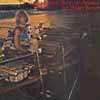 The California of the 1960s was a breeding ground for eccentric characters: psychedelic prophets, cult leaders, crank scientists, charlatans, fringe artists, bizarre self-taught musicians and psychotic burnouts. Some individuals, it seems, were able embody all of these archetypes at once; and of these, at least one managed to record and release an album. Bobby Brown's 1972 LP The Enlightening Beam of Axonda is a holy grail for collectors of rare psych, and one of the most idiosyncratic works to emerge from the West Coast petri-dish of psychedelics and self-motivated outsiders.
The California of the 1960s was a breeding ground for eccentric characters: psychedelic prophets, cult leaders, crank scientists, charlatans, fringe artists, bizarre self-taught musicians and psychotic burnouts. Some individuals, it seems, were able embody all of these archetypes at once; and of these, at least one managed to record and release an album. Bobby Brown's 1972 LP The Enlightening Beam of Axonda is a holy grail for collectors of rare psych, and one of the most idiosyncratic works to emerge from the West Coast petri-dish of psychedelics and self-motivated outsiders.
 After months of waiting, the final album from legendary rock bandGuided By Voices is now released, no doubt provoking water coolerdiscussions about the band's career in the offices of entertainmentmagazines everywhere. Fans have been divided for some time, too —though many buy the records on principal despite misgivings —particularly about Pollard's higher fidelity obsession since 1997's Mag Earwhig!.The record, then, has the unfortunate position of having to provide acloser for over 20 years of music in just fourteen songs, and for themost part it accomplishes this goal. There are plenty of tracks thatfeature the classic Pollard lyrical strangeness ("You're gonna fuck upmy make-up/you're gonna make up my fuck-up"), and a full complement ofmixing styles, so there's a summary of the band's style and functions.Sadly, it just doesn't have the magical realization that everyone hopesfor in a final album, but these sort of things rarely do. To expect aband to be able to sum it all up in those songs — the highs, lows,strife, stress, exhilaration, and passion — is a bit much, but thereshould be some hint of why this is the end. And there isn't here, thatI can find. What there is to be found is another quirky and catchygroup of songs, right out of the gate with "Everybody Thinks I'm aRaincloud (When I'm Not Looking)." Chiming guitar, Pollard'sdouble-tracked vocals, and solid backing make the song a rollickinggood time, and there is an overwhelming feeling of being let down andlonely by choices one has made. Perfect opener. Then the murderingdarkness of "Sleep Over Jack" takes over, and it's even more deliciousthan the opener, an almost modern day Sweeney Todd. It's thiswarring personality that consumes most of the record; a strugglebetween the light and dark sides of emotion, with no clear winner. Notthat there has to be: to choose between "Gonna Never Have to Die" or"The Closets of Henry" and "Tour Guide at the Winston ChurchillMemorial" or "Sing For Your Meat" would be impossible, anyway. That'sthe mark of a truly great album, where every song carries the wholealbum's weight and doesn't buckle. In that regard, this is the bestlegacy Pollard and Co. can hope for, including returning member TobinSprout, who recorded parts for the record, as well. This is what theywere adept at providing for their fans: whole albums of great songs.Once again, they succeed, and though it's not the last we'll hear ofthe band's members, it is this band that will be missed. Farewell, GBV,and thanks for the memories.
After months of waiting, the final album from legendary rock bandGuided By Voices is now released, no doubt provoking water coolerdiscussions about the band's career in the offices of entertainmentmagazines everywhere. Fans have been divided for some time, too —though many buy the records on principal despite misgivings —particularly about Pollard's higher fidelity obsession since 1997's Mag Earwhig!.The record, then, has the unfortunate position of having to provide acloser for over 20 years of music in just fourteen songs, and for themost part it accomplishes this goal. There are plenty of tracks thatfeature the classic Pollard lyrical strangeness ("You're gonna fuck upmy make-up/you're gonna make up my fuck-up"), and a full complement ofmixing styles, so there's a summary of the band's style and functions.Sadly, it just doesn't have the magical realization that everyone hopesfor in a final album, but these sort of things rarely do. To expect aband to be able to sum it all up in those songs — the highs, lows,strife, stress, exhilaration, and passion — is a bit much, but thereshould be some hint of why this is the end. And there isn't here, thatI can find. What there is to be found is another quirky and catchygroup of songs, right out of the gate with "Everybody Thinks I'm aRaincloud (When I'm Not Looking)." Chiming guitar, Pollard'sdouble-tracked vocals, and solid backing make the song a rollickinggood time, and there is an overwhelming feeling of being let down andlonely by choices one has made. Perfect opener. Then the murderingdarkness of "Sleep Over Jack" takes over, and it's even more deliciousthan the opener, an almost modern day Sweeney Todd. It's thiswarring personality that consumes most of the record; a strugglebetween the light and dark sides of emotion, with no clear winner. Notthat there has to be: to choose between "Gonna Never Have to Die" or"The Closets of Henry" and "Tour Guide at the Winston ChurchillMemorial" or "Sing For Your Meat" would be impossible, anyway. That'sthe mark of a truly great album, where every song carries the wholealbum's weight and doesn't buckle. In that regard, this is the bestlegacy Pollard and Co. can hope for, including returning member TobinSprout, who recorded parts for the record, as well. This is what theywere adept at providing for their fans: whole albums of great songs.Once again, they succeed, and though it's not the last we'll hear ofthe band's members, it is this band that will be missed. Farewell, GBV,and thanks for the memories.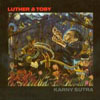 Providing less variation than this election year's candidates are, apiano/organ player and a drummer play music that, with few exceptions,relies on a formula of presentation and peculiarity to succeed. Thefirst thing that caught my eye is the rather distinct and beautifulpainting that adorns the cover of this album. It is painted by theClayton Brothers of L.A. and has a carnival appeal to it. The hands andfaces of figures are distorted and bring to mind visions of a morefocused Ren & Stimpy or maybe just a slightly less disturbing MarkRyden. The music is reminiscent of the ways carnivals have always beenportrayed in the movies. For the most part an organ dominates themelodic progression of the album and steady, almost military-like drumsundercut this dry movement of cheap thrills and train-wreck amusements.When the opening track began I was fairly thrilled; the obvious musicalreference to freak-show attractions promised quite a lot, but Luther& Toby deliver very little. Slowly the over-simple combination ofmusical elements becomes lackluster. There are moments when nothinghappens despite the fact that I know an organ is emitting a series ofnotes. Towards the end of the record, on songs like "Aluminum Lady" and"144,000," Luther & Toby manage to strike just the right mood bymoving away from their love of the strange and absurd. Gorgeousmelodies and shifting rhythms sweep together in a dramatic fashion andconjure up a need for repeat listens. But two or three songs aren'tenough to save an album that tried too hard to present a particularimage. No matter how engaging an initial idea can be, it's hard to makea record based on that idea alone or at least it's very difficult to doso without the music becoming samey in very quick fashion. While thephotographs in the booklet and the promise of "Lucrezia Borgia Waltz"made it seem as though Luther & Toby were going to ride down along, untrampled road, the majority of the album simply meditates on asuperficial and ultimately uninteresting image. If there are circusoddities and strange twists of genetic code to be found in the worldthis album only hints at them. At the last moment, on the closing "OhSore Sore Song," there is a vast emptiness opened up and a group ofvoices sing a tune that could've only been heard in local taverns andfor just a moment there is something truly engaging about the albumthat suggests a past or a history of someplace unique. The song is,unfortunately, only a minute and six seconds long. I don't want to sayLuther & Toby are a one-trick pony, but there's no differencebetween dressing an album like this in rich pictures and looselydeveloped concepts and dressing up a bunch of rich boys, giving thembad haircuts, and calling them "rock n' roll."-
Providing less variation than this election year's candidates are, apiano/organ player and a drummer play music that, with few exceptions,relies on a formula of presentation and peculiarity to succeed. Thefirst thing that caught my eye is the rather distinct and beautifulpainting that adorns the cover of this album. It is painted by theClayton Brothers of L.A. and has a carnival appeal to it. The hands andfaces of figures are distorted and bring to mind visions of a morefocused Ren & Stimpy or maybe just a slightly less disturbing MarkRyden. The music is reminiscent of the ways carnivals have always beenportrayed in the movies. For the most part an organ dominates themelodic progression of the album and steady, almost military-like drumsundercut this dry movement of cheap thrills and train-wreck amusements.When the opening track began I was fairly thrilled; the obvious musicalreference to freak-show attractions promised quite a lot, but Luther& Toby deliver very little. Slowly the over-simple combination ofmusical elements becomes lackluster. There are moments when nothinghappens despite the fact that I know an organ is emitting a series ofnotes. Towards the end of the record, on songs like "Aluminum Lady" and"144,000," Luther & Toby manage to strike just the right mood bymoving away from their love of the strange and absurd. Gorgeousmelodies and shifting rhythms sweep together in a dramatic fashion andconjure up a need for repeat listens. But two or three songs aren'tenough to save an album that tried too hard to present a particularimage. No matter how engaging an initial idea can be, it's hard to makea record based on that idea alone or at least it's very difficult to doso without the music becoming samey in very quick fashion. While thephotographs in the booklet and the promise of "Lucrezia Borgia Waltz"made it seem as though Luther & Toby were going to ride down along, untrampled road, the majority of the album simply meditates on asuperficial and ultimately uninteresting image. If there are circusoddities and strange twists of genetic code to be found in the worldthis album only hints at them. At the last moment, on the closing "OhSore Sore Song," there is a vast emptiness opened up and a group ofvoices sing a tune that could've only been heard in local taverns andfor just a moment there is something truly engaging about the albumthat suggests a past or a history of someplace unique. The song is,unfortunately, only a minute and six seconds long. I don't want to sayLuther & Toby are a one-trick pony, but there's no differencebetween dressing an album like this in rich pictures and looselydeveloped concepts and dressing up a bunch of rich boys, giving thembad haircuts, and calling them "rock n' roll."- I can't shake the feeling that Shirts and Pistolsis Hardman's version of "Shits and Giggles," as this album plays like acollection of oddball in-jokes and quirky jams thrown together for fun.Toying with pop song melodies and structures, Hardman wrangle upconvincing electro-pop tunes that owe less to the punk ethos ofelectroclash than to psychadelia and surrealist non-sequiturs. Songsabout superheroes share the disc with tracks that juxtapose the variousmeanings of "Hardman" using porn and preacher samples with equal gusto.When they want to, as on "100 Years," the duo can craft hypnotic,organic electro-trip pieces that hum with strings and reverb andrepeating vocal phrases that drift out of consciousness. On the otherhand, tracks like "18's Fabric" touch on a kind of groovy,digitally-enhanced folk that's full of free verse poetry, acousticguitars and vibes. Whether they are playing with bluesy tones, straightup electronic pop, or something a little more leftfield, the songs arealways tight and short, leaving the album with a bit of a compiled,schizophrenic feel. In fact, a few of the tracks just kind of stopdead, as if the experiment that spawned them was suddenly brough to ahalt. This is, if ever there was one, a studio album where accomplishedproducers and musicians have afforded themselves the time and means tojot down whatever ideas might strike them. With that approach, thereare inevitably a few tracks that could be trimmed without losing much,but nothing is so long as to overstay its welcome. It sounds a bitself-indulgent at times, and borders on being too intentionally weird,but somehow Shirts and Pistols manages to stay endearing and interesting for 17 tracks.
I can't shake the feeling that Shirts and Pistolsis Hardman's version of "Shits and Giggles," as this album plays like acollection of oddball in-jokes and quirky jams thrown together for fun.Toying with pop song melodies and structures, Hardman wrangle upconvincing electro-pop tunes that owe less to the punk ethos ofelectroclash than to psychadelia and surrealist non-sequiturs. Songsabout superheroes share the disc with tracks that juxtapose the variousmeanings of "Hardman" using porn and preacher samples with equal gusto.When they want to, as on "100 Years," the duo can craft hypnotic,organic electro-trip pieces that hum with strings and reverb andrepeating vocal phrases that drift out of consciousness. On the otherhand, tracks like "18's Fabric" touch on a kind of groovy,digitally-enhanced folk that's full of free verse poetry, acousticguitars and vibes. Whether they are playing with bluesy tones, straightup electronic pop, or something a little more leftfield, the songs arealways tight and short, leaving the album with a bit of a compiled,schizophrenic feel. In fact, a few of the tracks just kind of stopdead, as if the experiment that spawned them was suddenly brough to ahalt. This is, if ever there was one, a studio album where accomplishedproducers and musicians have afforded themselves the time and means tojot down whatever ideas might strike them. With that approach, thereare inevitably a few tracks that could be trimmed without losing much,but nothing is so long as to overstay its welcome. It sounds a bitself-indulgent at times, and borders on being too intentionally weird,but somehow Shirts and Pistols manages to stay endearing and interesting for 17 tracks.  Staubgold
Staubgold I first became aware of Minit through a 7" on Tonschacht, a label whoseuniform white-on-black sleeves have since become trusted markers ofshort-form, lo-fidelity electroacoustic works from a new vanguard ofinternational artists. "Bootleg" was the label's first release, and itcaptured my eye mainly because of the note: "inspired by and conceivedfor Chicks on Speed." Based on the starkness of the sleeve design andartist name, I had expected a darker, more cynical version of Chicks'jaunty, metro-centric electro. I wanted to hear a song like their"Night of the Pedestrian" stripped of its role-play humor and takeninto the streets for real; I wantedMinit to take electroclash from hot pink heels back to Suicide country,back to rhythms cold and gritty, stuck against the city's pulse. Thisdid not happen exactly. Minit sound nothing like Chicks on Speed.Instead, they play densely textured, drone-based music structuredgenerally around trad Minimalist ideas of simple and understatedmelody. Latticed field captures, robust organic loops, and stackedsynthetic vibrations combine to create immersive environments ofcertain constancy, but within which textural breakthroughs do occur.Like most works with a tendency towards explicit Minimalism, apart-for-the-whole aesthetic is available here, and any section ofthese four lengthy songs has potential to reveal a small, shimmeringworld of harmonic variations and sliding, evaporating tones. Tocontradictory effect, the music (especially the title track) also seemsto move towards specific melodic ascensions, approaching, at severalplaces, throbbing arabesques fit for a full orchestra. These betrayalsof subtlety, these breaks in the level planes created by so muchtextural detailing, create the unique paradox that helps Minit standout in a glut of like-minded musicians and becomes the only plausibleparallel to Chicks on Speed, a group whose success certainly relies onparadox and odd juxtaposition. For all its stasis and flat expanses, Now Right Heredoes not shy away from easily emotive forms, often leading songs intothe kind of swelling, post-rock flirtations associated with people likeGodspeed You Black Emperor!. Bits of Now Right Here remind me of the overpowering-yet-concise melancholy of William Basinski's Disintegration Loops.However, rather than keeping these moments of catharsis containedbehind the ever-widening sense of loss and distance that is unavoidablein the Basinski pieces, Minit works through a kind of reverse processin which the grandiose sections are slowly pieced together almost likeby-products of the music's droning surface play. The peaks or"destinations" in Minit's music are always anticipated though neverquite required, a special quality that keeps their records fresh forrevisiting and more than makes up for the relative familiarity of thegroup's sound. (It's worth mentioning also that two of this disc's fourtracks appeared on two recent Australian-scene compilations, Variable Resistance and Motion, though this one is probably worth checking out for its 20-minute title cut alone).
I first became aware of Minit through a 7" on Tonschacht, a label whoseuniform white-on-black sleeves have since become trusted markers ofshort-form, lo-fidelity electroacoustic works from a new vanguard ofinternational artists. "Bootleg" was the label's first release, and itcaptured my eye mainly because of the note: "inspired by and conceivedfor Chicks on Speed." Based on the starkness of the sleeve design andartist name, I had expected a darker, more cynical version of Chicks'jaunty, metro-centric electro. I wanted to hear a song like their"Night of the Pedestrian" stripped of its role-play humor and takeninto the streets for real; I wantedMinit to take electroclash from hot pink heels back to Suicide country,back to rhythms cold and gritty, stuck against the city's pulse. Thisdid not happen exactly. Minit sound nothing like Chicks on Speed.Instead, they play densely textured, drone-based music structuredgenerally around trad Minimalist ideas of simple and understatedmelody. Latticed field captures, robust organic loops, and stackedsynthetic vibrations combine to create immersive environments ofcertain constancy, but within which textural breakthroughs do occur.Like most works with a tendency towards explicit Minimalism, apart-for-the-whole aesthetic is available here, and any section ofthese four lengthy songs has potential to reveal a small, shimmeringworld of harmonic variations and sliding, evaporating tones. Tocontradictory effect, the music (especially the title track) also seemsto move towards specific melodic ascensions, approaching, at severalplaces, throbbing arabesques fit for a full orchestra. These betrayalsof subtlety, these breaks in the level planes created by so muchtextural detailing, create the unique paradox that helps Minit standout in a glut of like-minded musicians and becomes the only plausibleparallel to Chicks on Speed, a group whose success certainly relies onparadox and odd juxtaposition. For all its stasis and flat expanses, Now Right Heredoes not shy away from easily emotive forms, often leading songs intothe kind of swelling, post-rock flirtations associated with people likeGodspeed You Black Emperor!. Bits of Now Right Here remind me of the overpowering-yet-concise melancholy of William Basinski's Disintegration Loops.However, rather than keeping these moments of catharsis containedbehind the ever-widening sense of loss and distance that is unavoidablein the Basinski pieces, Minit works through a kind of reverse processin which the grandiose sections are slowly pieced together almost likeby-products of the music's droning surface play. The peaks or"destinations" in Minit's music are always anticipated though neverquite required, a special quality that keeps their records fresh forrevisiting and more than makes up for the relative familiarity of thegroup's sound. (It's worth mentioning also that two of this disc's fourtracks appeared on two recent Australian-scene compilations, Variable Resistance and Motion, though this one is probably worth checking out for its 20-minute title cut alone).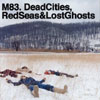 The most popular electronic French duo since Air have finally had their internationally acclaimed album issued in North America through Mute. Unfortunately, hearing this after the extended period of hype, I was expecting something more. Rather than hearing the masterpiece as so many have exploded about, my ears tell me this could easily be the most overrated album I can recall in a long, long time.
The most popular electronic French duo since Air have finally had their internationally acclaimed album issued in North America through Mute. Unfortunately, hearing this after the extended period of hype, I was expecting something more. Rather than hearing the masterpiece as so many have exploded about, my ears tell me this could easily be the most overrated album I can recall in a long, long time.
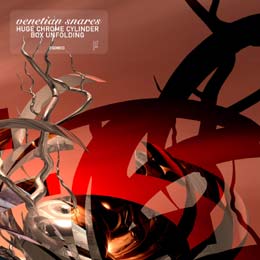 Despite his efforts to write a melodic album distanced from thebeat-driven erraticism and pop culture plunderphonics that have definedmuch of his work to date, Aaron Funk's eleventh album as VenetianSnares sounds like something Richard D. James saved to diskette andthrew in a corner. In all honesty if I had received this CD without anyartwork or indication of artist name, I would have written it off asanother Aphex Twin/Autechre/Mu-Ziq wannabe and thrown it in the pile tobe forgotten. The greatest fault of Huge Chrome Cylinder Box Unfolding lies in its lack of the mix of eccentric charms and sinister overtones found on previous releases like Horse and Goat, Find Candace, and the now-classic Doll Doll Doll.The sameness of the material makes the majority of the songspractically indistinguishable from eachother, making it difficult tolatch on to any one in particular. Gurgling MOS6581 sound chip melodiesand spastic percussion litter tracks like "Bonivital," "Coke Ajax," and"Nineteen1319" with little variation to speak of. "Keek" employs SpeakN Math equation gibberish to accent its tinny atmospheres while "Vida"fuses together Commodore 64 tones and glitchy hip hop with spottyresults. OK, Aaron, we get it. You like oldschool video game sounds.Thanks for clarifying. From reading my descriptions here, some readersmight be confused as to why I have such a negative view of thisrelease. To them I would say that good intentions and seemingly cleverideas are often far less enjoyable when implemented musically, as isthe case here. To be clear, Huge Chrome Cylinder Box Unfoldingis not an unlistenable affair, and without a doubt stands as Funk'smost accessible release to date. Still, after making a name for himselfwith music that is equally challenging and entertaining, thisderivative release ranks as an unmemorable entry in his relativelystrong catalog.
Despite his efforts to write a melodic album distanced from thebeat-driven erraticism and pop culture plunderphonics that have definedmuch of his work to date, Aaron Funk's eleventh album as VenetianSnares sounds like something Richard D. James saved to diskette andthrew in a corner. In all honesty if I had received this CD without anyartwork or indication of artist name, I would have written it off asanother Aphex Twin/Autechre/Mu-Ziq wannabe and thrown it in the pile tobe forgotten. The greatest fault of Huge Chrome Cylinder Box Unfolding lies in its lack of the mix of eccentric charms and sinister overtones found on previous releases like Horse and Goat, Find Candace, and the now-classic Doll Doll Doll.The sameness of the material makes the majority of the songspractically indistinguishable from eachother, making it difficult tolatch on to any one in particular. Gurgling MOS6581 sound chip melodiesand spastic percussion litter tracks like "Bonivital," "Coke Ajax," and"Nineteen1319" with little variation to speak of. "Keek" employs SpeakN Math equation gibberish to accent its tinny atmospheres while "Vida"fuses together Commodore 64 tones and glitchy hip hop with spottyresults. OK, Aaron, we get it. You like oldschool video game sounds.Thanks for clarifying. From reading my descriptions here, some readersmight be confused as to why I have such a negative view of thisrelease. To them I would say that good intentions and seemingly cleverideas are often far less enjoyable when implemented musically, as isthe case here. To be clear, Huge Chrome Cylinder Box Unfoldingis not an unlistenable affair, and without a doubt stands as Funk'smost accessible release to date. Still, after making a name for himselfwith music that is equally challenging and entertaining, thisderivative release ranks as an unmemorable entry in his relativelystrong catalog. M.V. Carbon and J. Gräf make noise that is slow, consumptive, andjello-thick and their method of ear-shattering is unique enough to makethem stand out among a sea of amateur feedback wankers. Keyboardsstretch and rattle like whale blubber waving in the wind and sonicwhines break the sound barrier in an attempt to reach light and breakit, too, but through all the chaos and unchecked sludge is that hint ofintention and arrangement that helps everything make sense. Metaluxmight have one foot in the out-of-control world of schizophrenic soundconstruction, but the other is firmly planted in the calm and coolrealm of careful preparation. After turning up their aggression theyconsider the variety they've presented, look it over like some hellishFrankenstein made from the bones of destroyed drum kits and nuclearguitars, and they craft it into rolling lines of synthetic bubbles andpurring sex kittens. Carbon and Gräf open up noise and reveal under itthe comedy of failing sounds; there are bloody llamas and pliantanimals to be found on this record. There's always a strange kind ofbeauty here that reminds me of why noise can be so great. Take theoverdriven guitar of "Splinter and Shimmer" for example: distortion,super-indulgence, and complete disregard for listener health has neversounded so lovely. The witch-like moan and screech of the vocals onthis track slip around the pure fucking animalistic drive of the guitarand the painful screech of electronics so perfectly, it's a surprisethat more individuals haven't tried this approach (it seems ripe fortheft and overuse). Metalux let it carry on for just long enough anddon't bother using it again—it's an addictive piece of songwriting thatonly increases with each listen. In other places the record is almostdanceable as drum machines pound away steady rhythms, alternatingbetween bass hits and persistent snare crunching. The noise that movesover it and the sometimes fascist ramblings of the vocalist create thekind of fear that only an epileptic thrust suddenly into a disco bashcould feel. "Airplane" and "Flexi-Armadillo" fit this bill well, butthere aren't just a few styles on this album. Nearly every song isunique and still Waiting for Armadillosticks together more cohesively than rock opera. "Rode West" soundslike it belongs in some world filled with secretly perverted clowns and"Mexico" might as well be put in every raver's CD player as a means ofterminally destroying their ability to dance and think. Both ofthem sound as though they were crafted from the same twisted brain andboth serve the greater purpose of lifting Waiting for Armadillo far above the usual onslaught of pummeling sound and into another dimension occupied only by itself.
M.V. Carbon and J. Gräf make noise that is slow, consumptive, andjello-thick and their method of ear-shattering is unique enough to makethem stand out among a sea of amateur feedback wankers. Keyboardsstretch and rattle like whale blubber waving in the wind and sonicwhines break the sound barrier in an attempt to reach light and breakit, too, but through all the chaos and unchecked sludge is that hint ofintention and arrangement that helps everything make sense. Metaluxmight have one foot in the out-of-control world of schizophrenic soundconstruction, but the other is firmly planted in the calm and coolrealm of careful preparation. After turning up their aggression theyconsider the variety they've presented, look it over like some hellishFrankenstein made from the bones of destroyed drum kits and nuclearguitars, and they craft it into rolling lines of synthetic bubbles andpurring sex kittens. Carbon and Gräf open up noise and reveal under itthe comedy of failing sounds; there are bloody llamas and pliantanimals to be found on this record. There's always a strange kind ofbeauty here that reminds me of why noise can be so great. Take theoverdriven guitar of "Splinter and Shimmer" for example: distortion,super-indulgence, and complete disregard for listener health has neversounded so lovely. The witch-like moan and screech of the vocals onthis track slip around the pure fucking animalistic drive of the guitarand the painful screech of electronics so perfectly, it's a surprisethat more individuals haven't tried this approach (it seems ripe fortheft and overuse). Metalux let it carry on for just long enough anddon't bother using it again—it's an addictive piece of songwriting thatonly increases with each listen. In other places the record is almostdanceable as drum machines pound away steady rhythms, alternatingbetween bass hits and persistent snare crunching. The noise that movesover it and the sometimes fascist ramblings of the vocalist create thekind of fear that only an epileptic thrust suddenly into a disco bashcould feel. "Airplane" and "Flexi-Armadillo" fit this bill well, butthere aren't just a few styles on this album. Nearly every song isunique and still Waiting for Armadillosticks together more cohesively than rock opera. "Rode West" soundslike it belongs in some world filled with secretly perverted clowns and"Mexico" might as well be put in every raver's CD player as a means ofterminally destroying their ability to dance and think. Both ofthem sound as though they were crafted from the same twisted brain andboth serve the greater purpose of lifting Waiting for Armadillo far above the usual onslaught of pummeling sound and into another dimension occupied only by itself.  The true test of the heavily layered, over-produced combo pop song is usually whether it can be played out in a solo performance, say at the ubiquitous open stage café or around the campfire, and still be strongly maintained. The singer/songwriter performance augmented with one or two other instrumentalists, preferably none of whom are playing the same instrument, usually has a raw and unique group charm, especially when performance is more the focus than production.
The true test of the heavily layered, over-produced combo pop song is usually whether it can be played out in a solo performance, say at the ubiquitous open stage café or around the campfire, and still be strongly maintained. The singer/songwriter performance augmented with one or two other instrumentalists, preferably none of whom are playing the same instrument, usually has a raw and unique group charm, especially when performance is more the focus than production. The electrified gong that radiates through the beginning moments of "Makruna" and continues through its 38 minute duration marks a phantom presence that galvanizes the whole of these recordings. The track "Minya" was originally recorded as a solo live performance in 1999, but it used elements of sound that had been previously recorded by both Colin Potter and Andrew Chalk. Only 111 copies of this performance were made, but now a reworked version‚Äîalong with two new tracks‚Äîhas been released in an edition of 500 copies.
The electrified gong that radiates through the beginning moments of "Makruna" and continues through its 38 minute duration marks a phantom presence that galvanizes the whole of these recordings. The track "Minya" was originally recorded as a solo live performance in 1999, but it used elements of sound that had been previously recorded by both Colin Potter and Andrew Chalk. Only 111 copies of this performance were made, but now a reworked version—along with two new tracks—has been released in an edition of 500 copies.



